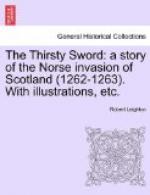At the fireside there sat an aged minstrel, whose duty it was to fill in the intervals of the feast with the music of his harp, or, if need were, to recite to the company the saga of King Somerled and other great ancestors of the kings of Bute.
Earl Hamish — a tall, courtly Highlander, with sad eyes and a long brown beard — sat at the head of the board, that with his own strong hands he might carve the steaming venison. At his right hand sat the earl of Jura, Erland the Old, and at his left Earl Sweyn the Silent. His beautiful wife, the Lady Adela — attired in a rich gown inwoven with many devices of silk, and spun by the Sudureyans — sat facing him at the far end of the board. At her right hand sat Earl Roderic of Gigha; and at her left Alpin, her son.
So the feast began, with much merry discourse of how the men had fared that day at the hunting in Glen More.
Now Erland and Sweyn, kinglings of Jura and Colonsay, though owing yearly tribute to their overlord, Alexander the Third of Scotland, were both men of the North, and they spoke with Earl Hamish in the Norse tongue. Their discourse, which has no bearing upon the story, was mainly of cattle and sheep, and of the old breast laws of the Western Isles. But Roderic of Gigha spoke in the Gaelic, which the Lady Adela, though an Englishwoman born, could well understand.
“Ah, but,” said he, addressing young Alpin, who had been boasting of the manly sports that might be enjoyed in his father’s dominions, “you should one day come to Gigha, for there, I do assure you, we have adventure such as you never dream of in Bute.”
“I marvel, my lord, how that can be,” said Allan Redmain scornfully, “for the kingdom of which you boast is but a barren rock in the mid sea, and methinks your beasts of the chase are but vermin rats and shrew mice.”
“The sports of which I speak, young man,” said Roderic, frowning and wiping his red beard with his broad hand, “are not such bairns’ play as you suppose. Our beasts of the chase are burly men, and our hunting ground is the wide ocean. I and my gallant fellows carry our adventures far into the north to Iceland and Scandinavia, or southward even into the land of the Angles, where there is sport in plenty for those who would seek it.”
The Lady Adela looked up in shocked surprise.
“But,” said she, “you do not surely count the Angles among your enemies, my lord? The Scots are at peace these many years with my country England.”
“I should be grieved to call any man my enemy who is your friend, my fair Lady Adela,” said Roderic gallantly. “But though the Scots be indeed at peace with King Henry, yet the brave Easterlings of Ireland do ofttimes find the need of slaying a few of your proud countrymen; and if I help them — well, where there is aught to be gained what matters it who our victims be, or what lands we invade? I am for letting him take who has the power to conquer. Let them keep their own who can.




